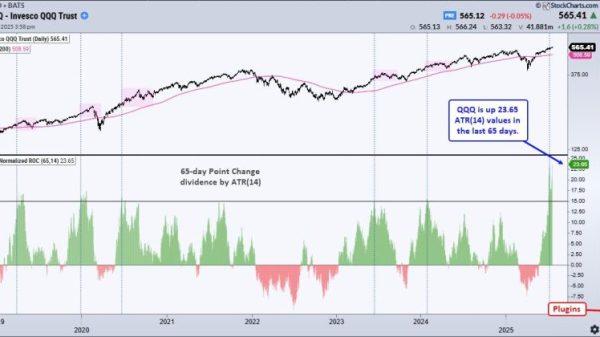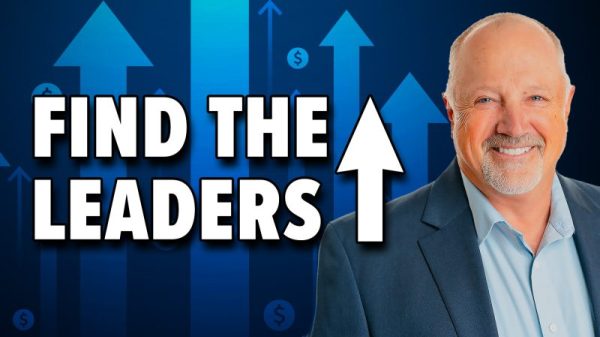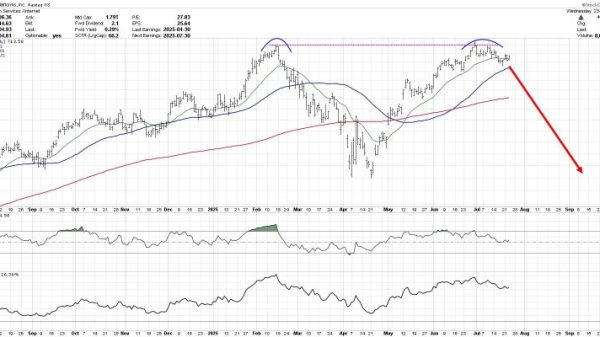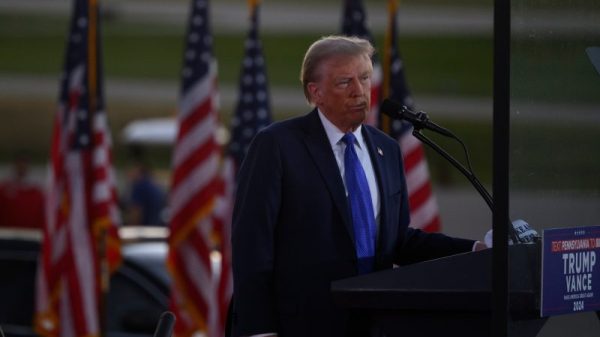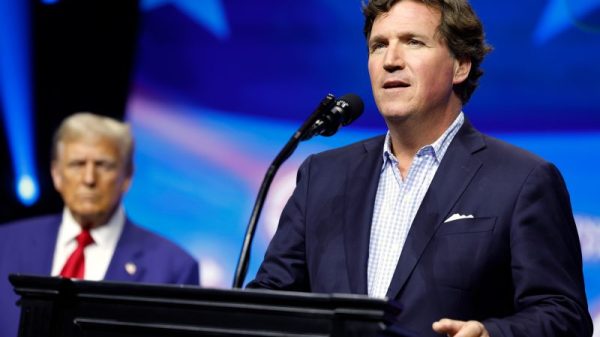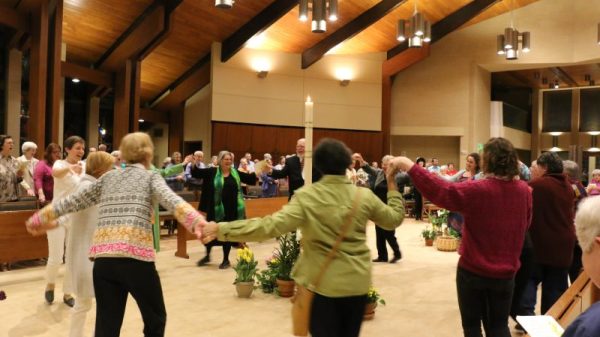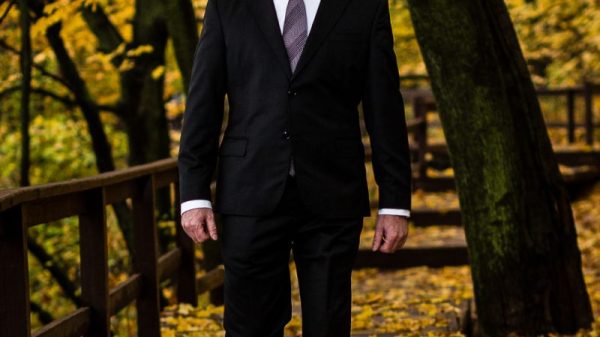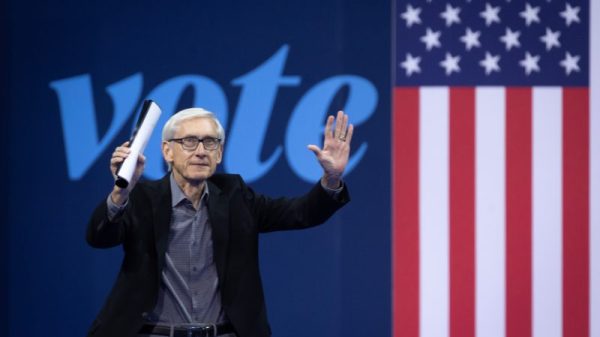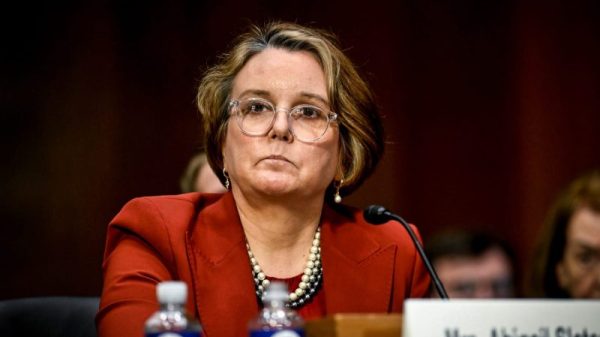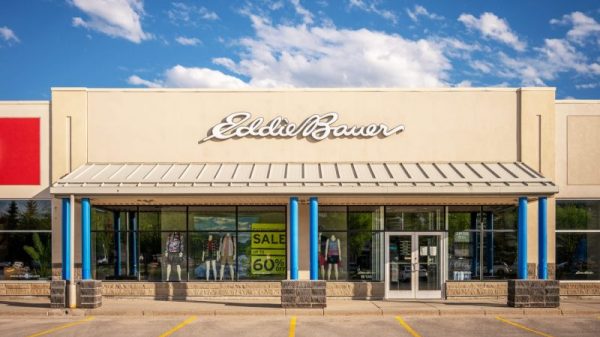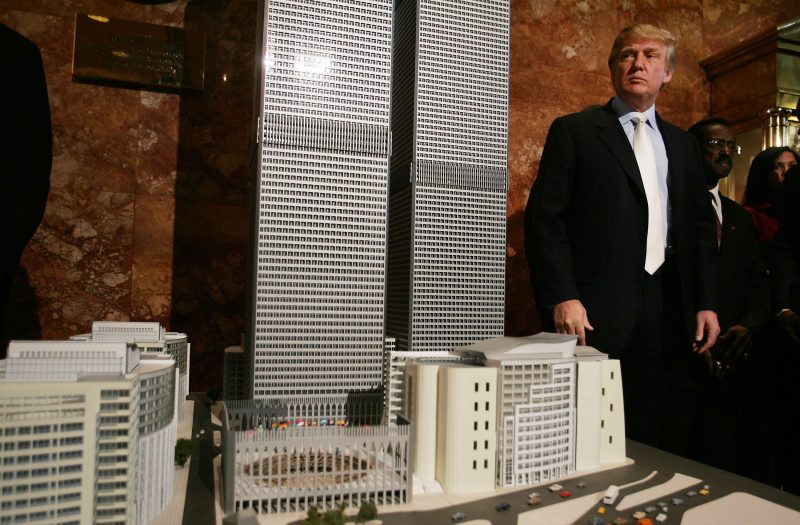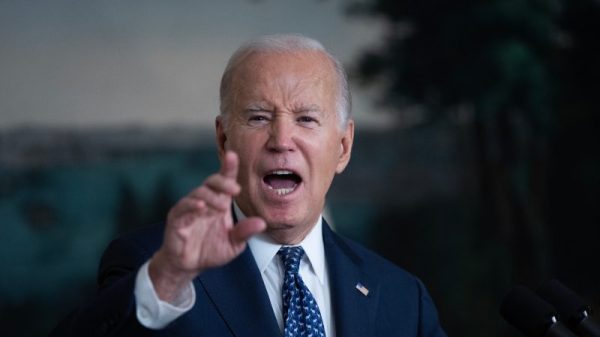NEW YORK — He was a publicity hound and a tabloid star. He was a developer who bragged about his acquisitions and exaggerated his wealth, emblazoning his name on towers that scraped the sky. He was a Queens boy made good — with no small amount of help from his father’s money — bursting onto the Manhattan scene through sheer force of personality.
Donald Trump was, in short, a certain type of New Yorker — brash, boorish, bombastic.
But now, in a New York trial that began Monday — Trump faces 34 counts of falsifying business records to cover up an alleged hush money payment to an adult-film star during the 2016 election — the former president’s long-running and turbulent love affair with the city seems to have finally run into irreconcilable differences.
Trump has officially decamped for his private Mar-a-Lago Club, changing his official residence in the third year of his presidency from Manhattan to Palm Beach, Fla. He has been walloped at the ballot box, losing his home state resoundingly in both 2016 and 2020 — even as he talks of hosting a rally at Madison Square Garden this year and urges his advisers to say he could win New York in November. A September 2017 NBC 4 New York-Marist New York City poll — from the first year of his presidency — found that 21 percent of New York City voters approved of him and 72 percent disapproved, with 54 percent “strongly” disapproving.
Now, a jury of his peers is set to decide his fate in one of four criminal cases he faces. But that is not all.
In February, New York Attorney General Letitia James won a civil fraud case against Trump, who was ordered by a judge to pay more than $350 million — a penalty that, with interest, tops out at closer to $450 million. And until he posted bond at the beginning of this month, James had been threatening to seize some of his major New York assets, including his prized 40 Wall Street and Trump Tower buildings.
Earlier this year, a New York jury awarded advice columnist E. Jean Carroll $83.3 million in a defamation case against Trump, which followed another New York jury last year finding Trump liable for sexual abuse in a civil case filed by Carroll.
To Trump, according to people who know him, the city he once aspired to inhabit now seems to be conspiring against him, culminating in something of a tabloid-style divorce — not dissimilar to the Page Six spectacle of the 1990 end of his marriage to his first wife, Ivana.
“My take from Trump was that he always had this huge fixation on New York,” said Melissa DeRosa, a top aide to former New York governor Andrew M. Cuomo, a Democrat who met with Trump in the Oval Office on multiple occasions. “He felt very burned by the people here and by the politicians. But he always wanted to know what was going on in the city, who was saying what, and he was very fixated on what was happening in New York.”
Trump’s New York is one of big brassy skyscrapers, big buxom blondes and big red ties. It is where he made a cameo in the 1992 “Home Alone” sequel during a scene at the Plaza Hotel — which he owned at the time — and it served as the high-pressure, moneyed backdrop for his hit show, “The Apprentice.”
It is garish and grandiose, not unlike Trump himself.
“He’s a New Yorker to his bones,” said Tim O’Brien, a senior executive editor of Bloomberg Opinion and a Trump biographer who is critical of the former president. “He’s an outer-borough New Yorker who loves New York sports and New York money and New York media and New York institutions and the New York business brawl, and he wants for all of that to accept him. And now he’s getting rejected in the most blatant and strong-minded of ways — by his peers, by voters, by judges.”
But it is also the New York of a consummate outsider, relentlessly striving for acceptance among the entrenched Manhattan elite — with Trump a real-life Gatsby, perpetually stretching toward the green light, just out of reach.
The Rev. Al Sharpton, a longtime New York civil rights activist and current MSNBC host, recalled appearing on MSNBC’s “Morning Joe” just after the 2016 election. The hosts asked him to explain Trump and how he managed to appeal to people seemingly so different from himself.
“You need to be from New York to understand Trump,” Sharpton said.
Sharpton offered his explanation on the air: Trump is an outsider from Queens, “not part of the Park Avenue real estate hierarchy and the blue bloods who eat at the Four Seasons and have breakfast at the Regency.” Trump called minutes later.
“I told my wife, ‘Al gets me,’” Trump said on the phone, according to Sharpton. “‘Al understands these muckety-mucks downtown, and they look down on me just like the establishment looks down on you. You’re from Brooklyn — you get it. And now, look at me! Can you believe it? I’m the president of the United States.’”
But Sharpton cautioned that a Manhattan jury is unlikely to be sympathetic: “He better know that 12 New Yorkers from a jury are not people who see themselves as outsiders.”
Todd Blanche, one of Trump’s lawyers, has suggested to Trump advisers that he believes the actual case is, on the merits, the weakest of the four Trump is facing — but that it will be difficult to win because the city’s jury pool dislikes him so much.
In a court filing last month seeking to delay the case, Trump’s lawyers unsuccessfully argued that New York County is “overwhelmingly biased against President Trump.” Alan Garten, another one of Trump’s lawyers, argued privately after Trump’s 2020 election loss that he needed to move his company out of the state, according to a person who heard him.
Spokespeople for Trump did not respond to questions for this article.
Trump’s physical sliver of New York has changed, too. His Trump Tower office in Midtown is mostly cleaned out, with little on the walls and “no hubbub and buzz, like there used to be,” said one adviser who has been there with him. Many of his longtime employees are gone, and his former chief financial officer is in jail.
Trump no longer ventures out to his favorite haunt for dinner, the throwback 21 Club — where the waiters knew his preferred table (No. 14) and his usual order (a well-done burger, with fries) — because the Secret Service and his motorcade snarled traffic. He is now sometimes greeted by loud protesters who can be heard inside his building.
This adviser, speaking on the condition of anonymity to share candid details, said that Trump “doesn’t have that many people to see there” anymore, and “it’s not like it once was.” Though the former president still loves his apartment in the city — a gilded triplex in Trump Tower — he says “doing business there isn’t like it used to be,” this person added. While in town for the trial, he has been spending nights there and hosting dinners with donors and world leaders.
In some ways, Trump’s split with New York, which was hastened by his political career, is unsurprising. The relationship had always been tumultuous and based on unequal, if mutual, need.
For many financial institutions, the appeal of doing business with Trump changed in the mid-to-late 2000s, said Robert Wolf, a former CEO and chairman of UBS Americas.
“Trump once was a brand that businesses would be fine attaching themselves to,” Wolf said, explaining that changed when all the major banks began viewing risk differently. “Some banks were comfortable with real estate exposure, some weren’t. Some were comfortable with casino risk, and some weren’t. … We were comfortable until we weren’t.”
Kathryn Wylde, the CEO of the Partnership for New York City, the city’s biggest business lobbying group, said the New York business community thought it was “incredible,” in a surreal way, when Trump became president.
“Everyone in New York who has dealt with Trump has a story, and most of them reflect unpleasant experiences doing business with him,” Wylde said. “Not all, to be clear — you have a few who are big fans. But the vast majority of people had a bad experience.”
Trump often wanted to use his fame to secure better deals. Cristyne Nicholas, a prominent public relations executive, recalled haggling with him over her contract to work on his golf course project in the Bronx in 2014.
“He believed we should have been doing this pro bono; his position was a lot of firms would do anything to be associated with the Trump name and fame,” Nicholas recalled.
Nicholas said she agreed to a below-market rate — and began courting politicians in the Bronx to appear. Soon, though, she saw perceptions of Trump change. “Every Bronx politician was chomping at the bit to speak and be invited, and a few weeks later, he announces he’s running for president, and they pretend they don’t know him,” she said.
Nicholas said she gently warned Trump against running for president, saying it would make him less popular in New York. He disagreed, citing “everyone I run into on the street.”
When he announced his presidential campaign in 2015, some former employees believed it was a gimmick to generate buzz for himself in New York, according to people who worked for him at the time.
Wylde added that Trump had never been a member of her partnership, nor the Real Estate Board of New York, the city’s most influential real estate group.
Nonetheless, in April 2017, Wylde brought a group of the city’s top real estate and finance CEOs to visit Trump in the Oval Office, where he lavishly praised them for being successful, calling them “killers.”
“He was very friendly,” she said. “He was thrilled when they all showed up to pay homage to him. That hadn’t happened before.”
In one meeting with Cuomo, a Democrat who had known Trump for decades, Trump talked about how New York real estate titans were “now my best friends” — a tongue-in-cheek reflection of his becoming president — and called Cuomo “my governor,” according to one attendee. After another coronavirus meeting with Cuomo that frequently veered off topic, Trump’s team wanted to have a news conference to highlight the governor of New York visiting the White House, but Cuomo demurred, according to Gareth Rhodes, a former Cuomo aide who attended the meeting.
But the president wasn’t always jovial. In a different 2020 meeting, he began by berating Cuomo because the New York attorney general had just subpoenaed his son — a development that wasn’t public, said DeRosa, the top Cuomo aide. Trump insisted that the governor had orchestrated it, but Cuomo was unaware of the subpoena.
“The meeting was over before it began,” DeRosa said.
Over two hours on a recent Friday outside 40 Wall Street, in the Financial District, hundreds of people snapped photos of Trump’s building, while only about 50 people entered and left the building. Three large security guards stood sentry in the marble lobby, taking special notice of individuals who approached.
Employees in the building have gotten accustomed to Trump visiting because of his court dates, and several said Eric Trump was a regular visitor.
In some ways — much like Trump Tower in Midtown — the iconic Wall Street building has become a tourist curiosity, as well as a recipient of animosity toward the former president. People who work there recounted a slew of incidents of Trump haters directing their ire at the building: the mentally ill man who entered the lobby and began screaming that Trump is a molester; the elderly woman who walked up and spit on the building; the person who flung what looked like urine at the tower; the large inflatable rat that was once positioned outside; the passersby who pause to hold up their middle finger.
Many of the employees in the building — which houses law firms, accounting firms and assorted other white-collar businesses — said they were not fans of Trump, nor of working at a facility with his name emblazoned on it in large letters. They described it as a typical Lower Manhattan high-rise office building, kept clean but with few frills. Since the pandemic, almost every employee said, the building has been far more empty.
But there were some supporters.
Ricardo Hudson, a 38-year-old IT professional who works in the building, said he “isn’t very political” but he’s a Trump fan.
“When I think of Trump, I think of billionaires and money,” said Hudson, who was born in Jamaica but grew up in New York, where he now lives. “I don’t think people appreciated him a lot as president, but now they’re saying they want to vote for him.”
David Roitblat, the founder of Better Accounting Solutions, which has an office in the building, said that as a businessman, he has closely followed the cases against Trump and believes they are “politicized.” If James had seized 40 Wall Steet, Roitblat said, he would have moved his company “on principle.”
Luke Hickinbotham, an Australian tourist visiting the United States, had ventured down to stretch his arm up and capture a picture of Trump’s building.
“Everyone at home thinks he’s crazy; even the conservative right-wing people think he’s a bit crazy. He’s kind of the epitome of bonkers America,” he said. “But he’s entertaining to watch if he’s not your president.”
Emily Guskin contributed to this report.

